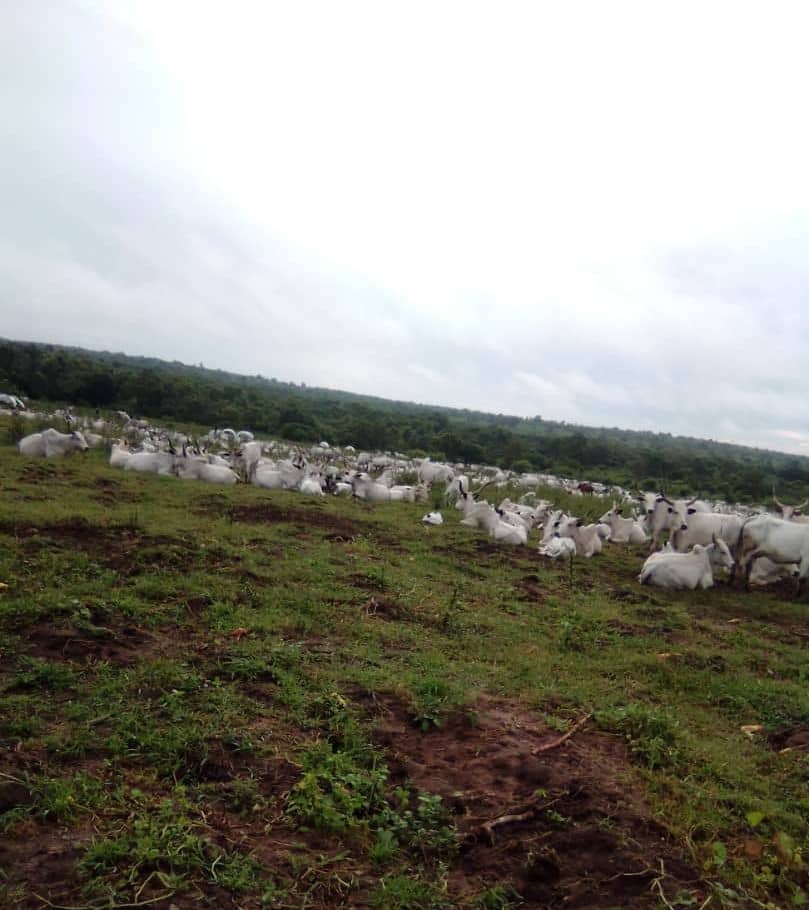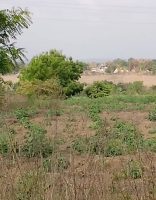Featured
IBARAPA: The Whirl before the Storm (2)
Published
5 years agoon
By
Editor
Because it fizzled out fast, the small war in Ibarapa seemed a trifle. Not at all.
By Segun Elijah
(First part begins from here)
“The reason is that Salihu left his henchmen behind,” said Adeagbo. “Two of them are Iskilu Wakili at Kajola, Ayete, and Shineri, seriki Bororo at Elekokan, before Igana, Oke Ogun.
“Wakili brought in no fewer than 200 fighters armed with AK-47, and they have looted, destroyed farms, and shops at Ayete, Magbeje, up to Oyan. They shot and wounded our people—about 50. The victims are now hospitalized at Adaba Hospital in Igbo-Ora.”
His report carried lots of horror. But it wasn’t exactly as he said at the hospital. Nor could he provide proof of the herders armed with AK-47 anywhere in Ibarapaland, before or now. On review, a couple of videos he presented originated from Benin and some Islamic militant camps displaying AK-47 guns and Rocket Propelled Grenades (RPG) launchers in places other than Ibarapa.
But Akowe Agbe went on, detailing his fact-finding and evidence gathering since 2010 when he said the Fulani violence escalated in Ibarapaland.
He dug into the plastic bag at his feet, rummaging in it as he talked.
“I don’t talk or fight without evidence.”
In the bag was his archive of lists of names, photos of the dead, the wounded, the kidnapped, ravaged farms with corpses dotting the landscape, all showing obscenity of violence. The sight was chilling.
The perps were generally believed to be Fulani—herders or bandits.
“Couldn’t they have Yoruba and other tribes among them?”
“Yes.”
That was how Adeagbo usually conceded when his evidence was fact-checked, and went the other way. It happened once in a while when he got his knickers in a twist. Pardon him. The reason was the zeal that made Akowe Agbe a defender sometime beclouded his facts. Like it did in the Adaba hospitalization narrative.
The one-storey hospital he mentioned was about 100 metres away from the expressway that skirted Igbo-Ora from Eruwa. Mak-Mercy Hospital was painted on the parapet of the first floor. Its ground floor had between four to five rooms, their doors and jambs coated in greasy grime.
“There were no persons shot or wounded by Fulani herdsmen admitted here in the last two weeks,” a doctor on duty said Monday morning.
Not that there were no emergencies in the hospital. The morgue attendant confirmed, with pictures, dead bodies brought in on Jan. 26—from the violence that erupted while Adeyemo’s supporters froze Salihu out of town.
Of all Adeagbo’s photographs (exhibits), none had any Fulani criminals caught. There were no copies showing AK-47 guns—or any gun at all—he said the herders usually armed themselves with. But there were plenty of visuals to prove the brutality of Fulani (herders’ or bandits’) attacks on farmers and regular people at Igangan and neighboring towns.
Mrs Serifat Adisa wasn’t a farmer. Until her murder Jan. 2, she was the oil dealer whose petrol station, Subawah Oil, sat along the Idere-Igbo-Ora road.
The manner of her death was most cold-blooded, typical of Fulani bandits’ attacks confirmed elsewhere across the nation.
It all started and ended between 7: 10 pm and 7: 30 pm. Adisa was done with her manager reckoning for the day, and was headed out to her house from her fuelling station.
“She carried a bag full of money made from the day’s sales, and the manager was trying to walk her down a little distance with a torchlight in his hand. From nowhere, a shooter fired at the torchlight,” a source close to the company narrated.
The shooter then fired more. Other armed men hopped out of their hiding in a bush opposite the station. One targeted the woman’s feet. By that time, the manager knew his boss was under attack. He ducked, and fell flat on his face.

Left: Late Adisa, bullet hole, bandits’ hideout
Minutes earlier, Adisa had asked her manager about their two night guards. One begged off officially for the night, the source explained. The other was expected to have resumed that night. So neither of them showed up during the attack.
The entire area was now under fire. Adisa was already bleeding. Two kids waiting at the next bus-stop got hit, too. They died right there. Her manager was slithering on the ground, rolling until he got behind the station’s office, scaled a fence, and escaped.
“I can’t even tell who they were, Fulani or whatever,” the manager was quoted as saying. But he knew, from the rat-tat-tat of the guns, the attackers were not carrying bean-shooters. The criminals’ faces would only be unveiled 40 days later. One of them was arrested in De Link Hotel nearby that night, while he made calls.
Feb. 11, the Oyo police command arraigned some 26 criminals, and 11 of them were parts of the gang that murdered Mrs Adisa. Nine of the murderers were Fulani, but not herdsmen.
While the manager escaped to inform the Idere community of the attack going on that night, the bandits dragged Adisa into the bush. They shot her in the belly many times, Oyo CP Ngozi Onadeko later revealed.
Amotekun responded quickly. Then came a detachment of soldiers from Operation Burst, the state’s joint-security task force. They initially thought the bandits kidnapped Adisa. So they left. But the soldiers came back, and, while combing the area, found her under a tree. Her hand clutched at something: the handles of the bag of money. The bandits already sliced the bag, and made off with the money. Mrs. Adisa was just there, bloodied, lifeless, rigor mortis setting in.
The two guards were arrested and paraded along with the suspected killers. They were the two non-Fulanis. They were Yorubas.
Even before the parade, Adeagbo agreed some of his tribesmen were accomplices in the Fulani criminalities roiling Ibarapa.
“Out of every 12 disciples, there must be a Judas,” said Akeem Lawal, Igangan’s town clerk. He sat opposite Akowe Agba.
Two of the Judases at Igangan actually trained under, and got their badges, as herders and criminals, from Salihu. They were clasped behind bars in 2019. And they owed their travail to their Fulani master.
Salihu took Taiwo and Kehinde Adeowo, natives of Igangan, sons of a butcher, under his wing years ago. It was a choice they made, Adeagbo said, to learn the ways of Salihu he frequently called a “heartless man of iniquity”.
His ways, as Adeagbo described them, were paved with greed, wickedness, blood, tears, and death.

Seriki Salihu
Salihu started out this enterprise over a decade ago. He brought in Bororos (alien Fulanis now terrorising Ibarapaland) and their herds from Niger Republic. “He’d later kill them off, and take over their cattle,” said Adeagbo. The practice became widespread. Criminal Fulani herders in Salihu’s orbit started kidnapping these Bororos, killing them, and rustling their cows. It got to a head at a point. The seriki Fulani of Randa in Abeokuta, Ogun, a brainy man by Adeagbo’s judgement, came over to Ayete to have a meeting with the Fulani leaders, police, and traditional rulers.
“He warned them that when there were no Bororos to kidnap, Salihu and his gang would start abducting members of the host communities,” Adeagbo said. Nothing changed. Except that the Bororos wised up. They, too, started bringing in their fellow countrymen from Niger Republic to Ibarapa.
But all these atrocities were not for Adeagbo’s eyes and ears only. He had witnesses. He presented all these and more to the six southwestern governors and the Ooni of Ife Adeyeye Ogunwusi. “I also took the then DPO Tajudeen Elejigbo to where Salihu usually buried the Bororos he killed.” AIG Kalafite Adeyemi, (now AIG Maritime) was also aware. None of them could rein Salihu back.
All along, the Igangan twin gaycats were honing their savage skills, bumping off the Bororos, and snatching cows for their master. “There were times they moved three, four, five truckloads of rustled cattle,” Adeagbo said. Salihu soon became well-heeled in the trade. He had his way with the police, including the former IGP Idris Ibrahim, and then Oyo Commissioner of Police Shina Olukolu.
“I can tell you boldly that IGP and Salihu are thieves. Tell them I said so,” Akowe Agbe said, his tribal marks stretching in emphatic defiance. He remembered one of the occasions when a particular Fulani criminal was about to be arrested. The man just packed all his fortunes—wives, children, and others—in a lorry, and zoomed out of Igangan. But he was nabbed at Ayete, and from there taken to the Oyo police command headquarters in Ibadan where he was detained.
Somehow, a signal came from the Louis Odion House in Abuja, ordering the police commissioner to apologise to the detainee for unlawful arrest, and release him. Salihu pulled the strings, Adeagbo said. He was that powerful. Adeagbo even said he was the go-to guy when negotiations with kidnappers ravelled up. Well, that could not be substantiated. No victims mentioned Salihu as part of their negotiation. With the portrait Adeagbo drew, if Salihu had wanted in on negotiations, really, no one could have spurned his offer.
He bought and got whatever he needed: bad cops, rotten judges, Amotekun coordinators, and respect from Asigangan, Oba Lasisi Adeoye who gifted the Fulani man a traditional title. For the oba, it was a taboo. And the Igangan people loathed their king for violating their tradition. For Salihu, the chieftaincy was just another feather in his cap. He got so cocky he didn’t respect Igangan royalty again. He would come late to the council of chiefs meetings; he’d dismiss cases where herders destroyed farm crops. He actually ran his own suzerainty within Igangan.
A couple of barnyard legends crept into the fables of the charmed life Salihu lived in Ibarapa. Some said he married a princess of Asigangan’s, one of the reasons both seemed indebted to each other. That was not true, Adeagbo said. But Akowe Agbe revealed how the traditional ruler and his chiefs went panhandling to Salihu for favors—in cash or cows—when they had naming, wedding and other ceremonies.
Salihu once called Akowe Agbe, and offered him golden handcuffs, too. The Fulani leader asked him to stop agitating for Ibarapa’s farmers, and name his price. “How many cows do you want? How many cars do you want? How many motorcycles, acres of farmland? We’ll settle you up.” DPO Tajudeen Ejigbo also witnessed this.
“I am not selling myself. I am not selling my freedom. But I assure you that what you are doing will (sic) transpire,” Adeagbo replied. “I want Nigerians to know these people came with the intention to take over our land in the southwest.”
Land is power at Igangan. And Salihu had swathes of it. The Fulani leader claimed he inherited it from his father who migrated there from Ilorin in the 70s. He said the area was designated a grazing zone, and handed over to his father. That legend had also been disputed. “It was designated a crop farming settlement, a project under a five-year development plan in the era of Jemibewon and Shagari. And it is on record,” Igangan’s clerk Akeem said. “Our forefathers just decided to put Salihu’s father in the Alagolo area because they didn’t want him to live with them in the community.”

Salihu’s estate at Alagolo, Iganagan
In any case, Salihu had acquired for himself more rolling vistas of arable land in the area. And he insisted it was from his honest penny. His own enclave, igaa, now sat somewhere in the middle of the vast lot, with layered security around it.
Even after it was burnt and deserted, the estate still commanded some awe. Deathly. “We can’t get closer,” a commercial motorcycle rider warned as we pulled up on the side of the Tapa-Igangan road, many kilometres away.
“Why?”
“There are Fulani men hiding in the bush. They have guns.” Two Igangan indigenes coming from farm were shot dead around the desolate estate.
In and around Salihu’s igaa, gun-bearing had a policy: open carry. Adeyemo was shot (Adeagbo couldn’t confirm if it was an AK-47 though he insisted the Salihus were armed with it) when he went there to announce the seven-day ultimatum. His sons were no less violent. Among them, according to a Fulani leader in Ibarapa, was Miyetti Allah Kautal Hore’s national secretary Alhassan Saleh. Saleh was always spitting fire and brimstone in defence of Fulani nationalism in Nigeria.
So it was in the middle of this brutal and dangerous living the Adeowo twins put in 15 years, and completed their pupillage in herding. They learnt to speak the bovine language, all the slaps and whistles. They could track the animals, read their hoofprints, and husband a herd like a Fulani nomad. Adeagbo said the twins equally got hardened in rustling, robbery, and kidnapping, equipped enough to break out after serving out their terms. Salihu wouldn’t give them their heads yet. But the boys broke off. And they paid dearly for it.
The twins had about 76 cows in their herd when they started out on their own. Their uncle had 36 of them. But when Salihu orchestrated their arrest in 2019, having branded them Yoruba criminals supporting Bororo bandits, he took over their herd. The boys had been kicking their heels in detention.
“I am ready to confront Salihu with all these allegations anywhere in Nigeria,” said Akowe Agbe. “Ask him what happened to the Adeowos and their herd—the 36 cows of their uncle’s, and those of their father’s.”
Whatever happened to the twins was a strategy. Adeagbo explained they were not the first victims. “Anybody that fell out with Salihu got burnt.”
But the Fulani don already put a spin on this.
After his eviction, in asylum, the seriki reeled out his efforts in ridding Ibarapa of criminal herdsmen. He expected to be judged on that ground—if only it was strong enough ground to withstand Akowe Agbe’s evidence.
“Salihu gave out the traitors within his ring as criminals so he too could boast he arrested his tribesmen [Bororos] caught in crimes,” Akowe Agbe said.
The seriki did exactly the same thing to the Adeowo gruesome twosome—the only Yoruba herdsmen Adeagbo knew.
Other Yorubas in the Fulani criminal underworld in Oyo might….
(To be continued)
Trending

 Latest4 days ago
Latest4 days agoYoruba film industry mourns as popular actress aunty Ajara passes away

 Trends5 days ago
Trends5 days agoTonto Dikeh reunites son with Churchill after decade-long split

 Business1 week ago
Business1 week agoRite Foods positions industry as catalyst for Nigeria’s clean energy transition

 Football7 days ago
Football7 days agoArsenal’s Osman Kamara completes permanent move to Blackburn Rovers

 Health6 days ago
Health6 days agoControversial preprint revives vaccine–autism debate, draws sharp pushback from medical experts

 Football6 days ago
Football6 days agoEPL: Confirmed transfer deadline day deals in January 2026

 Featured1 week ago
Featured1 week agoMidnight raids, teargas: Lagos deploys military-era tactics in mass evictions

 Business1 week ago
Business1 week agoCBN releases fintech report, maps growth, opportunities, risks in Nigeria’s digital finance sector

